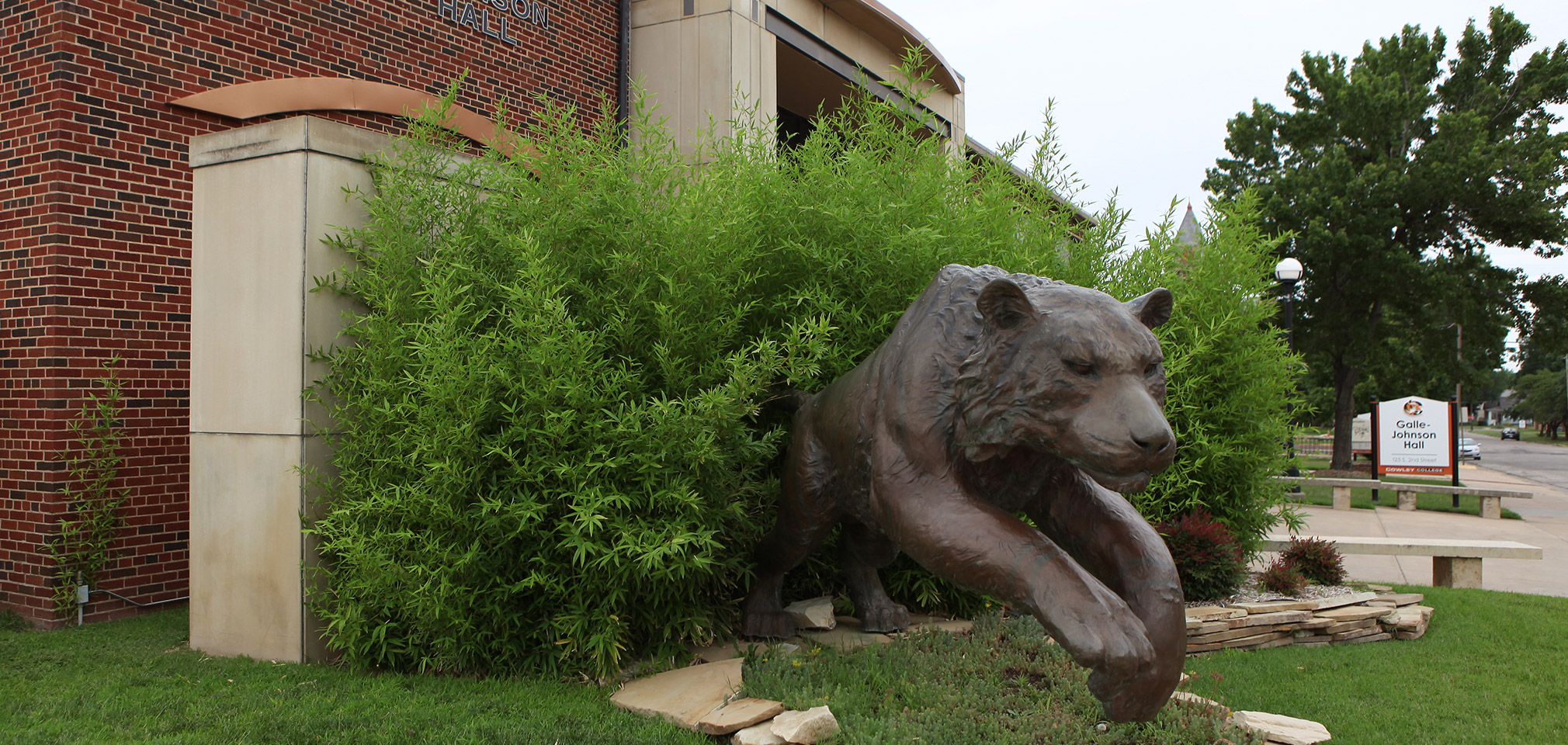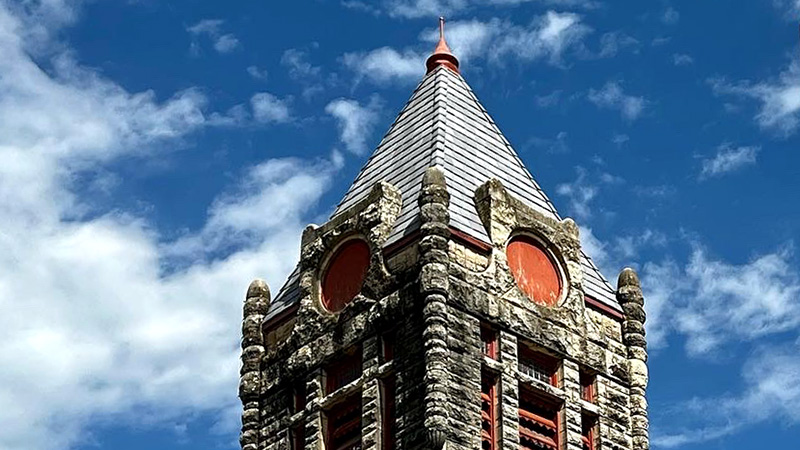Our History

Since 1922, Cowley College’s commitment to each student’s success in their chosen field is the force that has endured. Our desire to enrich each student’s life is the passion that has sustained us through good times and bad times. From our first day to our last, we will make a positive difference in the lives of our students.
The Heritage of Cowley College
We are proud of our heritage and excited about our future. Be a part of Cowley College.
The Arkansas City Junior College was established in 1922. For 30 years, the college had facilities in the basement of the Arkansas City High School. Because the “basement university” experienced incredible growth, the creation of a college campus began with the construction of Galle-Johnson Hall in 1950. In 1965 we changed our name to Cowley County Community College and Vocational-Technical School to reflect our position as the community college for Cowley County.
Today, Cowley College has campuses and educational centers throughout south central Kansas in Arkansas City, Mulvane, Wellington, Wichita, and Winfield.
 Play Video
Play Video
Cowley College Timeline
1920s
Our school began in 1922, where classes were taught on the top floor of the senior
high school where the Brown Center is today. In 1924, these classes were moved to
the school’s first floor or basement, which became known as the “basement university.”
1930s
The gymnasium, known as W.S. Scott Auditorium, was built in 1936. Its namesake Mr.
Scott served as the academic dean, dean of student affairs, and director of guidance
services from 1966-1986.
1950s
Groundbreaking began on Galle-Johnson Hall, named after the late Kurt R. Galle, dean
at the time of its construction, and the late Dr. Paul Johnson, the first president
of the College.
1960s
Dr. Paul Johnson became dean of the college in 1963 and was later designated the college’s
first president on July 1, 1967. A year later, in 1968, the Board designed a master
plan to purchase the land around Galle-Johnson Hall and the old Senior High School
(now known as Ireland Hall). On July 1 of that same year, Dr. Gwendel A. Nelson became
the college’s second president.
1970s
The Renn Memorial Library was constructed in 1972. The late Nell Renn, a well-known
Arkansas City resident, and a former Kansas legislator, set aside about $270,000 in
her will to build a library on the Cowley campus. Renn Memorial Library was named
in honor of Mrs. Renn’s late husband, Oscar “Jack” Renn, one of the early instructors
at the college and himself a Kansas legislator.
In 1973, a bond issue was passed to build the Harold B. Walker Industrial Technology Building and a central heating plant. Dr. Charles Kerr and Harold Walker have served the longest of any member of the college’s Board of Trustees since the first Board was elected in 1966. Both Kerr and Walker served 22 years.
In 1974, Ireland Hall was placed on the National Register of Historic Places and declared a state landmark. The building was officially dedicated on December 12, 1982, and named after W.H. “Pat” Ireland.
The Nelson Student Center and the Recreation Center (now known as the Linda Adams Hargrove Athletic Center) were new buildings on the campus in 1976. The Nelson Student Center was named after the second president of the college, Dr. Gwendel A. Nelson.
1980s
The first dorm, now known as the D. Robert Storbeck Dormitory, was opened with housing
accommodations for 80 students in 1980.
Dr. Patrick J. McAtee became the college’s third president on July 1, 1987. Also, in 1987, the college’s first prominent off-campus location was opened in downtown Mulvane. While the Kirke W. Dale Dormitory, named after a prominent attorney and State Senator from Cowley County, opened to house 86 students.
1990s
Cowley opened its first Wellness Center in 1992. It was initially located at 117 W. Central Ave. After four years in that location, it was moved to its current spot at 201 W. Fifth Avenue. The Wellness Center is open to students, employees, and the general public.
The William (Bill) R. Docking Dorm was opened in 1994. William R. Docking, a Chairman of Union State Bank in Arkansas City and president, CEO, and chairman of Docking Bancshares, is also the son of the late Kansas Governor Robert F. Docking.
The Brown Center, consisting of the Robert Brown Theatre, Earle N. Wright Community Room, and vocal and instrumental music rooms, was completed and dedicated in 1995 and named after the late Robert A. Brown and Roger A. Brown families of Arkansas City and Home National Bank.
2000s
In the fall of 2000, the Sid Regnier Bookstore was added to the Ark City campus. Regnier
was Cowley’s vice president of business services before retiring on October 3, 2000,
after 26 years of service to the college.
The Oscar Kimmell Dorm was opened a year later, in 2001, and houses 72 students. Kimmell was dedicated to the community and the college. He served a four-year term on the college’s Board of Trustees from 1979 to 1983 and served on the College Endowment Association from 1979 until 2002.
The Patrick J. McAtee Dining Center was dedicated and opened in 2001. The Dining Center was named after Dr. Patrick J. McAtee, the third president of the college.
The Wellness Center was officially named the Ben Cleveland Wellness Center in 2003. Cleveland was a long-time coach at Cowley College. He also served as an Industrial Technology instructor and Department Chair. He was inducted into the Tiger Athletic Hall of Fame in 2000. He passed away on January 15, 2002, at 69.
A $350,000 gift from the Daisy E. and Paul H. Brown Charitable Trust helped make the Webb-Brown Academic Center on the Arkansas City campus a reality. The building was formally dedicated on September 1, 2005.
Also, in 2005, a new automotive technology facility was opened in Mulvane to expand the Industrial Technology Department.
In 2008, the Central Avenue Dormitory was built. The Dorm can house up to 104 students.
2010s
The college added another new dorm, The Lodge, in 2011. The Lodge is a coed building
capable of housing 66 students.
Also, in 2011, the college unveiled the Travis Hafner Training Center, which benefits each of Cowley’s athletic teams and is considered one of the top junior college indoor training centers in the nation. The facility features a multi-purpose area, batting cages, a weight facility, an athletic training room, a pair of conference rooms, locker rooms, and restrooms.
For over two decades, Cowley has served over 20,000 students in the Wichita Metro area, from its early beginnings at the Southside Education Center, through today, with the opening of the Wichita Downtown Center in 2015.
Recognized as a pioneer in women’s athletics, Lady Tiger coaching legend Linda Hargrove was honored by having the Cowley College Recreation Building renamed the Linda Adams Hargrove Athletic Center during a ribbon-cutting ceremony on May 9, 2018.
Celebrating the historic opening of the Cowley College Sumner Campus Technology and Innovation Center in Wellington, KS, more than two hundred and fifty people attended a ribbon-cutting event held on August 9, 2018.
Along with the opening of the Sumner Campus Technology and Innovation Center, the Short General Education Center in Wellington opened in the fall of 2019.
Present
Cowley College offers multiple majors and career pathway possibilities to prepare
students for transfer to a four-year program or to enter the workforce with a two-year
job-ready degree. In addition, the College provides enrichment and training opportunities
to our community patrons and industries.
Cowley College is accredited by the Higher Learning Commission, a regional accreditation agency recognized by the U.S. Department of Education and coordinated by the Kansas Board of Regents.
Cowley offers over 120 different programs of study that guides a student on a pathway toward completing a degree or certificate.
Students can complete their first two years of coursework leading toward a bachelor’s degree at a university in virtually any field of study.
Cowley has transfer agreements with universities, online colleges, and technical schools in Kansas, Oklahoma, and beyond. Many associate degrees and certificates will give students the credentials and skills needed to immediately enter a specialized workforce.
